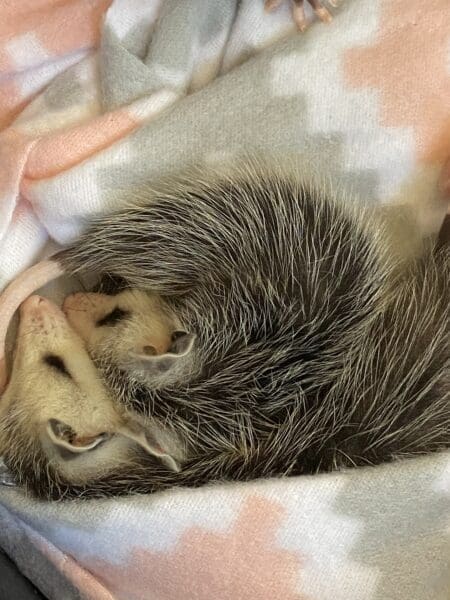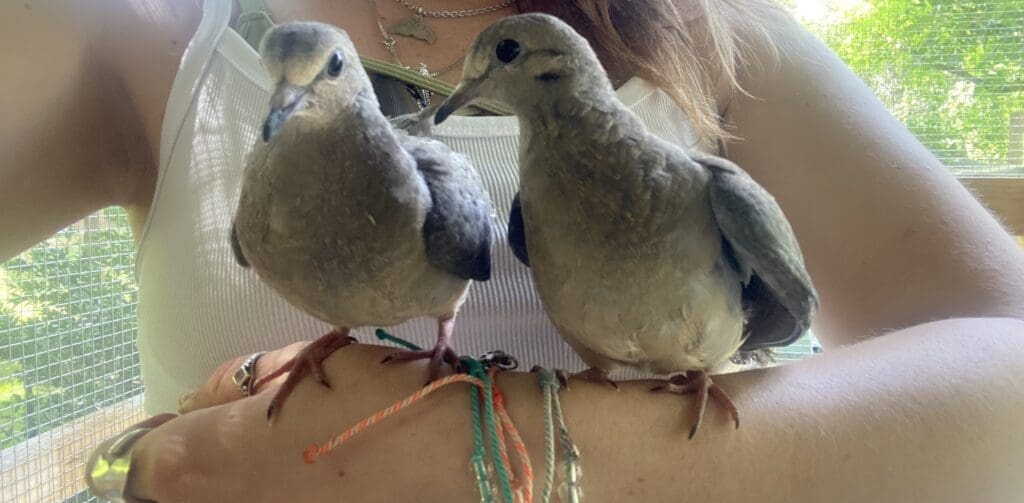Safe to say Jordan Castello is an animal person. Need proof? She chose Zoology as her field of study when she attended and graduated from Kent State University.
She’s served in many roles since then—volunteer firefighter, a village councilwoman, substitute science teacher, and even a server at a restaurant. And yes, during that span, she’s worked as a humane agent.
But animals are her true passion, and that’s why for the last three years, she’s worked in the field of wildlife rehabilitation. She worked in conjunction with Nicole Hafer Lipstreu, the wildlife rehab specialist in Muskingum County for much of that time since Muskingum County housed the closest rehabilitation centers to the Ohio Valley.
That’s no longer the case. Castello opened Feronia Wildlife Rehabilitation Inc. and has been caring for animals since. This is Castello’s first year open as a facility, and Feronia is now a 501c3 organization.
Castello’s office is in Bethesda, as is her recently acquired 12 acres of the leased property. She has both indoor and outdoor enclosures at her home and is looking to eventually build a free-standing facility on the leased land.
“That is the eventual goal,” Castello admitted. “Eventually, we’ll have a pre-fabricated building for each species—one for birds, one for mammals, and for on down the line. Right now, I don’t have my own permit, but I am a sub-permittee (through Hafer Lipstreu).
“That allows me to accept Category 1 animals. But I can transport and refer animals I cannot work with.”
Being Category I, Castello is not allowed to work with Rabies Vector Species (RVS) like raccoons, foxes, bats, and skunks.
Category I can rehabilitate healthy, orphaned, or non-rabies vector mammals like squirrels, rabbits, woodchucks, opossums. Castello also works with songbirds, both native and migratory, along with waterfowl. Like RVS animals, she can refer and transport Raptors to proper facilities.
Her goal is to eventually become a Category 2 facility, which requires three years of operation as a Category 1, plus the ability to properly care for wild animals that are diseased, injured, or require rehabilitative care.


Special Kind of Care
Helping rehabilitate wildlife is different from caring for a family pet or even a stray. Many of the animals in Castello’s care are considered prey animals.
They require a special kind of handling: the type not many are familiar with and, even for animal lovers, a type of handling that goes against their natural instincts to provide the animals love and affection.
That may be what your dog or house cat requires. But not, say, for example, baby squirrels.
“I’d see people post online about finding a bird, or a squirrel, or possum, and others would tell them to ‘just do this and you’ll be fine,’ and that’s really not the case,” Castello recalled. “And no one has a place locally to take these animals. The closest is in Zanesville, and that’s a lot of critical time wasted driving when an animal is in need of care.
“My passion has always been animals, so I wanted to help.”
Castello is gearing up for a busy spring, as like with flowers, birth in the animal kingdom is ready for its seasonal explosion. But the winter months weren’t without their trials.
Three baby red squirrels were brought to Castello’s care during the late fall, and she’s worked to raise them up during the winter. The trick has been to keep them healthy and ready for a soft release come spring, without handling them too much.
“We will go outside as soon as the weather breaks and start with a soft release,” Castello said. “That will allow them to get used to their surroundings.
“We’ll leave the enclosure open so they can figure things out about how to live and function, but still allow them to return to the nest they are used to. Once they find their place, they’ll stop returning to the nest, and we can close that cage.”
Castello said during wintering, she wanted to make sure they were cared for and kept comfortable, but for the most part, she tried to remain hands-off. She’d provide food and water, but otherwise, she made sure not to bother or interact with them. It’s hard for young wildlife to develop naturally whilst interacting daily with humans.
“I want them to develop their natural instincts,” she said.
Some of those instincts include self-preservation since these are prey animals. A healthy distrust, or even fear, of humans is preferable as strange as it may sound to the uninitiated.
“Typically if someone finds a wild bunny, they’ll pick it up, hold it, and hug it, because they think that’s making the bunny comfortable,” Castello said. “But that animal is very frightened and is likely nearly scared to death.
“If you find any animal, pick it up and put it in a dark place or container. If you can’t find the parent and put it back with its family, give a local rehabilitator a call. We will take care of it. You don’t have to try to feed it or anything, but give it a warm, dry, dark place until you can get a hold of a rehabilitator.”
Castello understands; as stated, she’s an animal lover too. But wildlife requires a different type of love, especially when it needs to eventually be returned to its natural habitats and be expected to survive. A squirrel or rabbit entirely trusting and dependent upon humans is not going to make it in the wild.

Fundraising and Crawfish
Being able to help the animals is time-consuming and requires funding. As a 501c3, Castello’s center is a non-profit.
But rehabilitation centers are not government funded, and while the Ohio Department of Natural Resources issues permits and regulates the centers, it does not provide funding.
Castello is able to apply for grants, but the majority of her funding comes from donations and charity.
That’s why there will be a Crawfish Boil Fundraiser on Saturday, March 5, at Chapz Bar & Grill in Belmont. The event runs from 4-8 p.m. with all proceeds benefitting Feronia Wildlife Rehabilitation.
The cost is $30 a person, which includes two pounds of crawfish, potatoes, corn, mushrooms and onions, a beverage, and dessert. Only pre-orders are being taken for the crawfish, and tickets can be purchased by calling (740) 921-3594.
There will also be 50/50 drawings and raffles on the day of the event. For those that want to help out, but don’t like crawfish, Chapz’s full menu assortment will be available.
“Tickets are selling well, although we could always use more sales,” Castello said with a slight laugh. “It would be a really great boost. Our main goal with the crawfish is to offer something different. You always see spaghetti dinners, steak fries, but we want people to get excited about something different.”
For more information about Feronia Wildlife Rehabilitation, visit it on Facebook, or call the center at (740) 921-3594.

